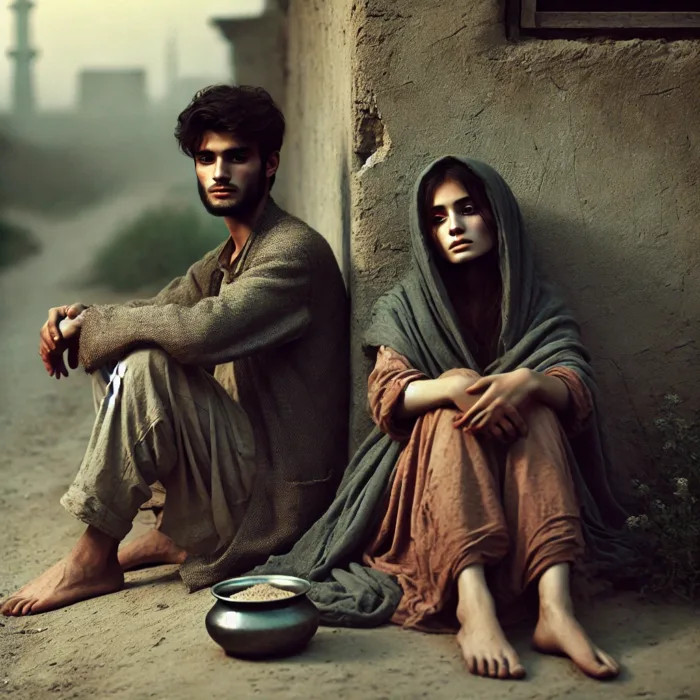Table of Contents
Introduction
In the Qur’an, the terms “fakir“/”فَقِير” (poor) and “miskiin“/”مِسْكِين” (needy), are used to describe different levels of poverty, and understanding the difference between them is crucial to determine who deserves Zakat. Scholars of the Arabic language have differing opinions about their precise meanings, which affects how we interpret these key concepts in Islam.
Defining Poverty in the Qur’an
Some scholars say that “fakir” refers to someone who possesses very little, but still has something, while “miskiin” describes someone who has nothing at all. The “fakir” might have enough for a day’s meal, but it is insufficient, whereas the “miskiin” is in complete destitution. They support this view with the verse from Suurat ‘Al-Balad:
“Or a needy person in misery“1

The word in Arabic used to express misery is “matrabah“/”مَتْرَبَة” or “dust”, which symbolizes someone in extreme poverty, grounded to the earth.
Others, however, argue that the “miskiin” is not completely destitute, pointing to the verse in Suurat ‘Al-Kahf:
“As for the ship, it belonged to miskiins working at sea“2.

This suggests that they did have some possession, but it was not enough to meet their needs. In this case, the ship was shared by a group of “miskiins” who depended on it for their livelihood. Thus, linguists are divided on whether the “fakir” or “miskiin” is in greater need. Some say the term “miskiin” comes from the word “sukuun” (stillness), symbolizing a person who is so overwhelmed by need that they are figuratively stuck to the earth, unable to move.

The word “miskiin” is derived from the verb “sakana“/”سَكَنَ” and follows the pattern of intensification, much like “mictiir“/”مِعْطِير” (someone with an abundance of perfume) or “mintiiq“/”مِنْطِيق” (someone who speaks frequently). Therefore, some scholars believe that “miskiin” implies a deep, overwhelming stillness due to need.
Zakat Eligibility for Fakir and Miskiin
Both the “fakir” and “miskiin” are entitled to “zakaat“/”زَكَاة” (charitable giving) in Islam. Whether someone has nothing at all or merely less than what is necessary to survive, they both qualify for Zakat, as ALLAH has commanded that these individuals be supported.
The term “caa’il“/”عَائِل” in Suurat ‘Aḍ-Ḍuḥaa, in the verse
“And HE found you poor and made [you] self-sufficient“3

is a broader term that can encompass both the “fakir” and “miskiin“, among others. Some interpret “fakir” as someone so burdened by poverty that it’s as if their backbone is broken by the weight of it.
Dr. Fadel Saleh Alsamerai, in his analysis, leans towards the interpretation that the “fakir” is in greater need than the “miskiin“, as ALLAH mentioned the “fakir” first in the relevant verse. By doing so, it is suggested that ALLAH intended to highlight the one in greater need of Zakat.
Distinguishing Ḍucafaa’ from Mustaḍcafiin in the Qur’an
As for the difference between the terms “ḍucafaa’“/”ضُعَفَاء” (weaks) and “mustaḍcafiin“/”مُسْتَضْعَفِين” (those oppressed), the latter refers to people who are oppressed or subjugated by others, while the former describes individuals who are inherently weak. For example, the Israelites were “mustaḍcafiin” (oppressed) by Pharaoh, as mentioned in Suurat ‘Al-Qaṣaṣ:
“And WE wanted to confer favor upon those who were oppressed in the land…”4.

This means they were subjected to the power and authority of a ruler. In contrast, “ḍucafaa” simply refers to those who are naturally weak, as in Suurat ‘Al-Baqarah, where ALLAH says:
“…and has weak [i.e., immature] offspring…”5.

The term “mustaḍcaf“/”مُسْتَضْعَف” implies oppression regardless of the person’s inherent strength or weakness, indicating that a tyrannical power has imposed its will on them, subjugating them with harshness and denying them their rights, while forcing them to bear unbearable responsibilities.
Sources:
- Dr. Fadel Saleh Alsamerai. الفرق بين (الفقير و المسكين) و( الضعيف و المستضعف) | د. فاضل السامرائي. YouTube Video.

